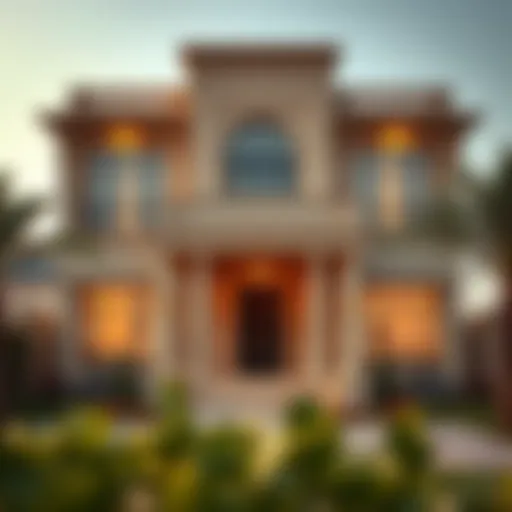Discover Souq Deira: Dubai's Iconic Traditional Market
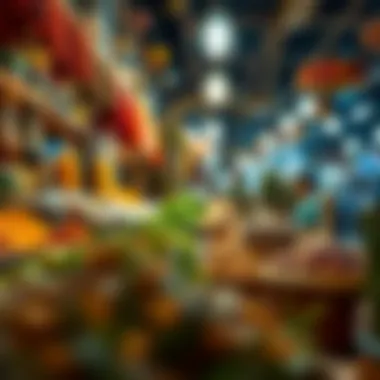

Intro
Souq Deira stands as a testament to Dubai's rich history and vibrant culture, a place where the past and present intertwine. Nestled in the heart of the city, this bustling marketplace serves not only as a shopping hub but also as a cultural crossroads, attracting tourists and residents alike. As you walk through the narrow alleyways lined with shops, the sights and sounds create an experience that’s hard to forget.
With a history steeped in trade, Souq Deira is more than just a collection of stalls; it’s a living museum of local commercial practices and customs. The blend of aromas wafting from spice vendors, the sparkle of gold from jewelers, and the vibrant textiles on display offer a kaleidoscope of choices for those who wander through. The souq encapsulates the spirit of Dubai, a city known for its rapid transformation while still giving nods to its heritage. This article will navigate through the intricate layers of Souq Deira, shedding light on its significance in the modern marketplace and how it continues to shape local commerce.
Through this exploration, readers can expect to uncover the evolution of Souq Deira, tips for navigating its lively streets, as well as insights into the variety of goods found within its walls.
In addition, the marketplace's adaptation to current trends and future possibilities will be highlighted, especially for those looking to invest or engage with the local economy. As we continue, join me in discovering the myriad experiences symbolizing the essence of Dubai's traditional market scene.
Intro to Souq Deira
Souq Deira stands as a monument to Dubai's rich tapestry of commerce and culture. As one of the city’s most iconic marketplaces, it seamlessly connects the past with the vibrant present. For investors, realtors, developers, and buyers, understanding the intricacies of this souq is paramount for tapping into its commercial opportunities and cultural heritage.
Among the bustling stalls and winding alleys, Souq Deira offers not just goods and services but an experience that echoes the traditions of generations. Its importance extends beyond mere shopping; it holds the keys to understanding how Dubai's economy has evolved while still staying rooted in its historical context.
Historical Background
The history of Souq Deira is rich and layered, reflecting the broader narrative of Dubai’s growth from a modest fishing and pearling village to a thriving metropolis. The marketplace has stood since the early 20th century, emerging as a vital center for trade as merchants from various regions congregated to barter and sell their wares.
Originally, the souq played a crucial role in linking local communities with international trade routes. Its status blossomed as merchants traded valuable goods such as spices, textiles, and handcrafted items, establishing Deira as not just a commercial hub but also a melting pot of cultures and ideas. Through the years, the souq has witnessed significant changes, adapting to modernization while preserving its distinct historical essence.
Today, you can still observe remnants of its storied past in the architecture and layout of the market. The narrow alleys and traditional shopfronts continue to transport visitors back to a time when trade was conducted face-to-face, and community ties were paramount. This historical backdrop offers invaluable insights for buyers and investors seeking to understand the dynamics of local commerce and tourism.
Cultural Significance
Souq Deira is more than a marketplace; it’s a cultural landmark that encapsulates the spirit of Dubai’s diverse inhabitants. It's a space where the threads of tradition are woven into the fabric of modern life. The souq serves as a microcosm of the city itself – a blend of East and West, past and future.
While navigating the stalls, one gets a sense of the local customs and practices that have shaped Emirati culture. Artisans display their handcrafted jewelry, spices are sold by weight, and the air is filled with the tantalizing aromas of traditional foods. There is a rhythm to life here, one that speaks to the heart of the community.
Moreover, Souq Deira is a gathering point during cultural festivals and events, reflecting the vibrancy of Dubai’s traditions. Its close-knit atmosphere encourages community interaction, fostering relationships that extend beyond commerce.
In summary, the significance of Souq Deira cannot be understated. It’s not just about what is available for purchase, but understanding how this space cultivates a sense of belonging and showcases the legacy of its people. For investors and developers, recognizing this cultural importance could influence future business strategies and development projects.
Architectural Features of Souq Deira
The architectural features of Souq Deira represent a compelling blend of tradition and evolution. This market is not only a hub for commerce but also a showcase of design that reflects the rich heritage of Dubai. Understanding the structural elements of Souq Deira provides insight into how architecture influences the shopping experience and embodies the local culture.
Traditional Design Elements
When strolling through Souq Deira, one can’t help but notice the traditional design elements that dominate its layout. The architecture here is heavily influenced by Islamic design, characterized by intricate geometric patterns and elegant arches.
- Wind Towers (Barajil): A notable feature in many traditional buildings, these towers are designed to catch and direct wind into the interiors, offering natural cooling long before air conditioning was a thing. This design not only provides comfort to the shoppers but is also an ingenious method of climate control relevant to the desert climate.
- Wooden Screens (Mashrabiya): Often seen peeking through the sun-soaked openings, these wooden lattice screens create beautiful shadows inside while maintaining privacy. They are a testament to the skilled craftsmanship that dates back centuries and add to the allure of the market.
- Marketplace Layout: The winding paths and narrow alleys of Souq Deira are designed for exploration. Each turn offers a new sight, whether it’s a vibrant spice shop or a stall filled with intricate textiles. The design encourages social interaction and a sense of community, where locals and tourists alike can engage in the bustling atmosphere.
These traditional elements not only enhance the aesthetic of the souq but also serve practical purposes, linking past architectural wisdom with contemporary needs.
Modern Additions
As with many historical sites, Souq Deira has not remained static. Modern additions complement the old without overshadowing its heritage.
- Upgraded Facilities: In recent years, the souq has seen improvements like enhanced lighting, signage, and the installation of modern restrooms. Such upgrades make the experience more comfortable for a diverse range of visitors.
- Fusion of Styles: The blend of new construction materials, such as glass and steel, with traditional stone and wood creates a striking contrast. For instance, some sections have glass facades that reflect the vibrant market life while allowing natural light to flood the space.
- Accessibility Features: Recent architectural considerations also focus on inclusivity. Ramps and wider pathways have been added for those who require assistance, demonstrating a commitment to welcoming everyone into this vibrant marketplace.
These modern elements do not detract from the charm of Souq Deira; instead, they harmonize with the historic architecture, ensuring that the souq remains a relevant and functional marketplace in today’s context.
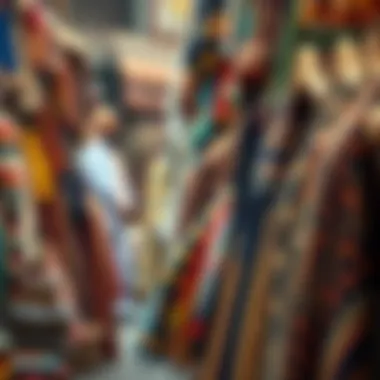

In summary, the architectural features of Souq Deira, from traditional design elements to modern upgrades, reflect a commitment to preserving cultural integrity while adapting to contemporary needs. This delicate balance is what makes Souq Deira a unique destination for both locals and visitors alike.
Goods and Services Available
The essence of Souq Deira encapsulates not only its architectural beauty and cultural significance but also the vast array of goods and services available. This marketplace is a treasure trove that promises a rich experience for those seeking both traditional Emirati products and unique items from various cultures. When you stroll through its bustling lanes, the mingling scents, colors, and sounds beckon you to explore further. Understanding what to expect in terms of offerings can enhance the overall experience and enrich one’s journey; here, one finds a blend of history, commerce, and artistry.
Souvenirs and Handicrafts
As you meander through Souq Deira, don't miss the opportunity to pick up some souvenirs and handicrafts, which are emblematic of the region's artistic talent and cultural heritage. Here, you can find hand-made items that range from intricately designed jewelry to pottery and traditional wooden carvings, often reflecting the art forms passed down through generations.
These items serve not only as mementos of your visit but also as conversation starters. A beautifully crafted ashtray or a coffee pot, for example, could become a centerpiece in your home, sparking interest in your travels. What makes these crafts stand out is the personal touch involved in their creation; artisans often pour heart and soul into their work, ensuring each piece tells a story of its own.
Some recommended spots for grabbing quality souvenirs include Aladdin's Cave and the various shops along the narrow passageways. Just keep in mind that these handcrafted treasures often come at a price reflecting the effort involved, so don’t shy away from some polite haggling! It’s all part of the experience.
Textiles and Fabrics
Next to the souvenirs, one must explore the vibrant world of textiles and fabrics available at Souq Deira. This section of the market is rich in variety, showcasing brightly colored silks, cottons, and traditional Emirati attire. You’ll discover that each stall displays not only the fabrics but also the story behind them, enhancing their value. Pashmina shawls and embroidered dresses made from fine textiles are particularly popular among visitors looking to take a piece of local fashion home.
In addition to garments, there are textile accessories such as intricate scarves, wraps, and caps, perfect for those who appreciate functionality combined with style. These offerings reflect the cultural diversity of the region, as many textiles draw influence from various traditions.
A visit to the textile section isn’t complete without engaging with the vendors. These entrepreneurs often have a wealth of knowledge about their products and can provide fascinating insights into the origin and craftsmanship involved.
Spices and Cuisine
No visit to Souq Deira is complete without indulging in its spices and culinary offerings. The air is thick with the scents of cardamom, saffron, and cumin, enticing anyone who passes through. You’ll find an impressive variety of spices neatly arranged in colorful piles, often packaged and labeled in a way that elevates their appeal. Each spice can be an essential addition to your home kitchen, enriching your culinary skills with flavors reminiscent of the region.
Furthermore, consider tasting some local Emirati dishes while you're there. Local eateries, scattered throughout the souq, offer a taste of traditional foods such as falafel, shawarma, and hummus, finely prepared and served to perfection. This allows visitors not only to shop but to also grasp the culinary culture that ties into the broader Emirati identity.
A must-try is the saffron-infused rice served with grilled meats, a dish that often ends up as the highlight of many dining experiences within the souq.
"Exploring the culinary delights and goods available at Souq Deira allows visitors to connect with the culture and history of Dubai on a deeper level."
In summary, Souq Deira presents a myriad of goods and services that encapsulate the spirit of Dubai; from handcrafted souvenirs to vibrant textiles and local spices, each offering is a unique invitation to experience the traditions of a region where the past meets the present.
Navigating Souq Deira
Navigating Souq Deira is a nuanced endeavor that can significantly enhance your experience within this bustling market. The layout may seem chaotic at first glance, but understanding the essential elements can help you navigate its winding alleys with ease. This section delves into how to effectively explore Souq Deira, focusing on maximizing your visit through proper timing, local transport options, and safety measures.
Timing Your Visit
Timing can make or break your experience at Souq Deira. The market has a rhythm of its own, swaying between the quiet echoes of early morning and the lively bustle found in the late afternoon.
- Best Times to Visit: Early mornings, around 9 AM, offer a peaceful ambiance, perfect if you're looking to leisurely stroll through the stalls. Conversely, visiting later in the day, from 4 PM onwards, brings the market to life, vibrant with local vendors and enthusiastic shoppers.
- Seasonal Considerations: Bear in mind that winter months, from November to March, attract more tourists due to pleasant weather. This means more crowded scenes but also a vibrant atmosphere filled with events.
- Special Events: Keep an eye out for cultural festivals or shopping promotions. Attending during these times can provide a unique experience that combines traditional goods with unique activities for both locals and visitors alike.
Local Transportation
Getting to Souq Deira is half the fun, with various options catering to all types of travelers. Here’s what you can use to make the most of your trip:
- Metro: The Dubai Metro is a reliable option. With the Al Ras station just a short walk from the souq, it's an efficient way to dodge the city's notorious traffic.
- Buses and Water Taxis: Numerous bus lines operate in the vicinity, providing flexibility for both locals and tourists. The nearby creek offers traditional water taxis (abra) that not only get you across the water but serve as a charming historic experience.
- Taxi Services: If public transportation isn't your cup of tea, consider using ride-hailing apps like Careem or Uber. They offer convenience and direct access to specific locations, perfect after a long day of exploring.
Safety and Precautions
While Souq Deira is generally a safe place to explore, being aware of your surroundings and implementing some precautions can ensure a more enjoyable experience.
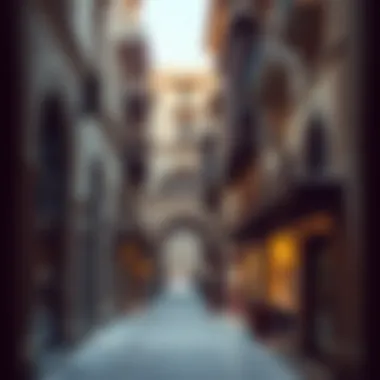

- Valuables Awareness: Like any busy market, keep an eye on your belongings. Use bags that can be closed securely to minimize the risk of petty theft.
- Stay Hydrated: The Dubai heat can be relentless, especially during the summer months. Always carry water with you and take breaks in shaded areas to avoid overheating.
- Respect Local Culture: Be respectful of local customs—this includes dressing modestly and being polite in conversations. The markets are a part of the local culture, and showing respect helps enrich your interaction with vendors and locals alike.
"Navigating through Souq Deira is not just about shopping; it's a journey that connects you with Dubai's deep-rooted heritage and lively present."
By considering timing, local transportation options, and safety, your experience in Souq Deira can transform from a simple shopping trip to a memorable cultural encounter, full of stories to share and treasures to bring back.
For more information on Dubai’s public transport, you can visit Dubai's Roads and Transport Authority.
More insights about Dubai and its attractions can also be found on Wikipedia and Britannica.
The Experience of Shopping at Souq Deira
Shopping at Souq Deira is not merely a routine transaction; it’s an experience that brings the very essence of Dubai’s culture to life. As visitors step into the bustling market, they are greeted by a lively symphony of hawkers calling out their wares, the tempting smell of spices wafting through the air, and a vibrant display of textiles and handicrafts. The mingling of scents, sounds, and sights creates a unique atmosphere that transports shoppers back in time, making the souq a crucial focal point in understanding both local customs and commercial practices.
Bargaining is what really sets this experience apart from more modern shopping venues. It is an art that goes beyond mere price negotiation—it's about engagement and connection. With each sale, a story unfolds, and a relationship is established. Understanding this dimension of shopping at Souq Deira is essential for anyone wishing to grasp the integral role the souq plays in the daily lives of those who frequent it.
Moreover, shoppers at Souq Deira can expect to find a diverse range of products. From handmade crafts unique to the Emirati culture to local spices that add flavor to dishes, there’s something here for everyone. Navigating this kaleidoscope of goods becomes an adventure in itself. Whether it’s seeking that perfect souvenir or immersing oneself in local culinary delights, the experience at Souq Deira makes every shopping trip memorable.
"The true spirit of Souq Deira lies not only in the goods sold, but in the stories shared and friendships fostered along the way."
Bargaining Tips
Engaging in the tradition of bargaining at Souq Deira can be daunting for first-timers, but approaching this ritual with the right mindset and technique can enhance the experience significantly. Here are a few tips to keep in mind:
- Do Your Homework: Before stepping into the souq, it helps to research typical prices for the goods you are interested in. Knowing the market average can arm you with confidence when engaging with vendors.
- Start Low: When making an initial offer, start below the expected price point. This sets the stage for a back-and-forth that is customary in bargaining.
- Be Polite and Smile: A friendly demeanor can go a long way. Building rapport with the seller may lead to better deals and a more enjoyable experience.
- Walk Away if Necessary: If the price doesn’t feel right, don’t be afraid to walk away. This often encourages the seller to reconsider their price.
- Remember It's a Game: Bargaining is as much about the interaction as it is about the price. Enjoy the process and embrace the cultural exchange.
Unique Shopping Experiences
Shopping at Souq Deira extends beyond purchasing items; it presents unique experiences that can’t be found in modern retail environments. Here are some highlights:
- Cultural Tours: Many local guides offer customized tours that focus on specific categories of goods, like textiles or spices. Joining these tours enhances understanding and appreciation of items bought.
- Workshops: Some vendors occasionally host workshops, allowing shoppers to learn about traditional crafting techniques. Engaging in one of these hands-on experiences offers insights into the craftsmanship behind the products.
- Tasting Sessions: Many spice shops allow customers to taste samples before buying. Experiencing the flavors firsthand enhances the shopping endeavor and makes it more interactive.
- Local Artisans: Visitors might stumble upon artisans at work, honing their crafts right in the heart of the souq. Seeing a traditional method in action adds a layer of authenticity to items purchased.
In summary, the experience of shopping at Souq Deira goes beyond mere purchases; it is a portal into Dubai’s traditional culture, filled with sensory wonders and cultural exchanges that captivate anyone willing to explore.
Culinary Delights at Souq Deira
The culinary landscape at Souq Deira is not just about food; it’s a rich tapestry of flavors, aromas, and experiences that reflect Dubai's vibrant culture. As the oldest marketplace in Dubai, Souq Deira presents a unique chance to taste the essence of the Emirati heritage. The intersection of traditional cooking methods and contemporary influences creates a dining scene that caters to both locals and tourists alike.
Traditional Emirati Cuisine
When one speaks of Traditional Emirati Cuisine, it evokes visions of aromatic spices, fresh ingredients, and time-honored recipes passed down through generations. Dishes like Al Harees and Majboos dominate menu offerings, showcasing the blend of simplicity and depth.
- Al Harees consists mainly of wheat and meat, cooked to a creamy consistency over many hours, reveling in its comforting flavors. It's typically served during special occasions, making it a nostalgic dish for many Emiratis.
- Majboos, a spiced rice dish often served with chicken or lamb, brings out the warmth of spices such as saffron and cardamom, making every bite an exquisite journey through taste and aroma.
Exploring the local eateries, visitors can often spot jasmine tea being served alongside meals, a refreshing experience that rounds out the culinary offerings.
Street vendors in Souq Deira offer an immersive experience into Emirati culture. One can readily find dates—nature's candy—stuffed with nuts or drizzled with honey, perfect for a quick snack while wandering through the souq.
The emphasis on hospitality in Emirati culture is often reflected in their culinary practices. It’s common for meals to be shared, fostering a sense of community and warmth.
Popular Local Eateries
Within Souq Deira, the choices of Popular Local Eateries are plentiful yet intimate, ranging from bustling food stalls to charming restaurants. Here are a few notable spots:
- Al Bait Al DOMA: Known for its authentic dishes, this spot prides itself on using recipes that have stood the test of time. Visitors rave about their Knafeh, a sweet pastry cheese dessert, uniquely satisfying.
- Al Fanar: This eatery takes patrons on a nostalgia trip with its traditional decor and menu items inspired by Emirati history. It’s the perfect place for those looking to indulge in Shawarma or delightful Samboosa during a casual lunch.
- The Arabian Teahouse: It offers more than just food; it serves an experience. Patrons can enjoy a wide range of teas and traditional refreshments in a setting that reflects the old-world charm of Dubai.
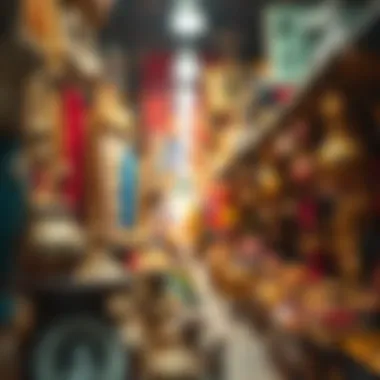

Each of these eateries exhibits a unique flair, yet they all share one common bond: celebrating the rich heritage and flavors of Dubai. Wandering through Souq Deira while savoring a homemade karak tea is a quintessential part of the experience, allowing one to truly soak in the souq’s atmosphere.
As visitors navigate these culinary delights at Souq Deira, they not only feed their appetite but also engage with the heart and soul of the Emirati culture, making every meal a story waiting to be shared.
Events and Festivals at Souq Deira
Souq Deira serves as a beacon of lasting traditions amidst Dubai’s fast-paced modernity. The events and festivals that occur throughout the year bring vibrancy to the souq, allowing visitors to engage more deeply with the culture and community spirit. These happenings not only celebrate the heritage but also provide a lively backdrop to shopping, making the souq a dynamic place to explore.
Cultural Festivals
Cultural festivals are at the heart of Souq Deira’s charm. Every year, the souq often hosts events tied to major national celebrations and cultural heritage days. For instance, the UAE National Day, celebrated on December 2, transforms the souq into a canvas of colors, music, and dance. Street performances, traditional dances, and craft stalls display Emirati culture in its glorious forms.
These festivals act as catalysts for bringing the community together. Local artisans often showcase their handmade crafts, providing visitors with a chance to appreciate not just the goods, but the stories behind them. Festivals like these let tourists get a taste of traditional Emirati life, as families stroll alongside visitors, sharing the spirit of community and pride in their heritage. Moreover, it becomes a time of intercultural exchange. Visitors from various backgrounds can partake in activities like Arabic calligraphy workshops or henna painting, bridging gaps and fostering understanding.
"Experiencing a cultural festival at Souq Deira isn’t just about watching; it's about participating and becoming part of something larger than oneself."
Shopping Promotions
Shopping promotions at Souq Deira add yet another layer of excitement for both locals and tourists. Several times a year, coinciding with major holidays or festivals, the souq has special offers that can't be missed. Discounts and bundles on souvenirs, spices, and textiles encourage visitors to delve deeper into the market. For example, during the Eid celebrations, you might find special pricing on traditional garments or exquisite jewelry that just begs to be taken home.
Moreover, various shops in the souq can come together for collaborative promotions; a scenario where you might need to purchase a specific amount from one shop to get a reward from another. This not only enhances the shopping experience, encouraging exploration, but often leads to friendly interactions with shopkeepers, who are eager to share stories about their items and the significance behind them.
In an ever-evolving retail landscape, seasonal promotions provide an opportunity for small business owners to amplify their visibility and reach a wider audience, thereby weaving themselves into the fabric of Dubai’s commercial tapestry.
The Future of Souq Deira
As Souq Deira continues to capture the essence of Dubai's vibrant marketplace, its future presents both challenges and opportunities that will dictate its role in the ever-evolving landscape of commerce. This section aims to explore planned developments and the significance of cultural preservation, emphasizing its importance for investors, realtors, developers, and buyers alike.
Planned Developments
The evolution of Souq Deira is being carefully planned to enhance its appeal while staying true to its roots. Various projects are in the pipeline, which aim to enhance infrastructure without compromising its traditional allure. These developments include:
- Improved Facilities: Renovations are set to introduce modern amenities, such as updated restrooms, enhanced security systems, and better overall accessibility.
- Expanded Retail Options: Plans to bring in a diverse array of shops will cater to both locals and tourists, blending traditional offerings with contemporary goods.
- Technology Integration: Implementation of digital tools that assist visitors, such as interactive directories or mobile apps, will improve the shopping experience and make navigation simpler.
- Sustainability Initiatives: Efforts to make the souq more environmentally friendly, through waste reduction programs and promoting local products, are gathering momentum.
These developments not only aim to attract more visitors but ensure Souq Deira retains its status as a must-visit destination. They will likely increase foot traffic, benefiting both small artisans and larger retailers alike. The blend of the old and the new will further position the souq as a relevant player in Dubai's dynamic retail sector.
Preserving Cultural Heritage
While modernization is needed, it is equally important to safeguard the rich cultural history that Souq Deira embodies. The souq is not just a shopping destination; it's a living museum that reflects the traditions and history of trade in the Gulf region. Key considerations in this respect include:
- Continuation of Traditional Crafts: Supporting local artisans by featuring their crafts helps preserve age-old skills. This isn't merely about commerce but about ensuring that the story of the souq survives for future generations.
- Community Engagement: Involving local communities in the decision-making process for future developments can enhance a sense of ownership over the space and its cultural significance.
- Enhanced Educational Programs: Workshops and events that highlight the heritage of the souq can draw in visitors who appreciate culture alongside commerce, making the shopping experience more enriching.
"As we look to the future of Souq Deira, it is imperative that we do not lose sight of our past. Balancing modernization with cultural preservation will pave the way for a vibrant market that honors its heritage."
Epilogue
In wrapping up our exploration of Souq Deira, it’s essential to grasp the marketplace's significance in the context of not just Dubai, but the broader narrative of preservation and evolution of culture. Souq Deira is not merely a shopping destination; it stands as a symbol of the meeting of worlds—where the traditional and the modern embrace each other.
Reflection on Souq Deira's Role Today
Today, Souq Deira has emerged as a key player in Dubai's economic landscape while also fostering a sense of belonging among local residents. This bustling hub reflects the city’s journey from an age of trade and barter to a thriving cosmopolitan center known for luxury and innovation. Yet, in its heart, the souq remains tied to its roots, holding a mirror to the customs and practices that have shaped Emirati culture.
To put it simply, the souq envelops visitors in an atmosphere brimming with authentic experience. It showcases intricate handicrafts, aromatic spices, and textiles that weave stories of Dubai's past. For investors, realtors, and developers, understanding the essence of such traditional markets can inform strategic decisions related to commercial development in the area. As Dubai continues to change, the preservation of cultural sites like Souq Deira becomes paramount not only for sustaining tourism but also for nurturing community ties.
In essence, as Souq Deira adjusts to the waves of modernization, it does not let go of its heritage. The blend of old and new architectures, the vibrant marketplace, and the enduring traditions surrounding trade practices highlight the city's commitment to honoring its past while sprinting towards the future. The soul of Dubai can indeed be felt in the hustle and bustle of this marketplace, a place where one can sense both history and the ever-evolving narrative of urban life.
"In the heart of the city, Souq Deira serves as a living testament to the resilience of tradition amidst modernization."
Reflecting on Souq Deira's role today invites us to recognize its importance—not simply as a shopping venue, but as a cultural and economic bedrock that enriches the community of Dubai. As such, for those considering involvement in the region, acknowledging this balance is crucial in cultivating a sustainable future that respects and honors what has come before.











